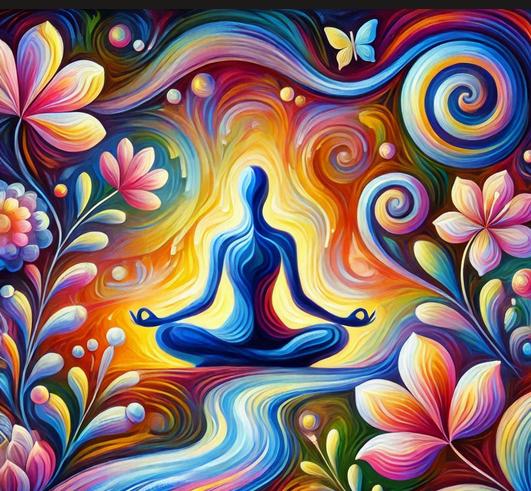The Mysticism of Love: How to Cultivate Deep Compassion in Relationships
Love is a central theme in mystical traditions across the world. It is the essence that binds us to one another, to the divine, and to the universe itself. From the Sufis who speak of love as the force that pulls the soul toward God, to the Christian mystics who embody the love of Christ as divine grace, to the Buddhist understanding of boundless compassion, love is the mystical energy that transcends the ordinary and touches the eternal.
Yet, while love is a profound and transcendent concept, it is also deeply practical. Mystical love is not simply an abstract or philosophical idea, but a living, breathing force that can be embodied and cultivated in our daily relationships and interactions. To live in love, to embody compassion, is to bring the mystical into the realm of the ordinary.
As a practitioner of mysticism, I have come to understand that love is not merely a feeling or a romantic ideal but a practice, an art, and a path toward spiritual growth. Love, in its highest form, is not about attachment or possessiveness; it is about deep, unconditional compassion that embraces all beings and all circumstances. It is through the cultivation of love in our relationships—with ourselves, with others, and with the world—that we can truly experience the divine presence in every moment.
In this essay, I will explore practical ways to embody mystical love and compassion in your everyday interactions. By integrating these practices into your life, you can cultivate deeper, more authentic relationships that reflect the divine love within you.
1. Understanding the Mysticism of Love
Love, in the mystical sense, is not limited to the romantic or familial forms we often associate it with in everyday life. Mystical love goes beyond these categories and represents a deeper, universal force that transcends time, space, and ego. In this sense, love is both the experience of the divine within us and the way we connect to the divine in others.
The Sufis, for example, believe that love is the very essence of creation. Rumi, the great Sufi poet and mystic, famously wrote, “Love is the astrolabe of God’s mysteries.” In Sufism, love is the force that leads the soul back to its source. It is not something that is only experienced in the human realm, but is felt in the encounter with the divine, and in our relationships with one another.
Similarly, in Christian mysticism, the idea of “agape” love—unconditional, selfless love—calls us to transcend the ego and express divine love through compassion, humility, and forgiveness. This love is not a fleeting emotion but a deep spiritual practice that requires constant attention and intention.
In Buddhism, love takes the form of “metta,” or loving-kindness, which is the wish for all beings to be happy and free from suffering. It is a practice of radiating unconditional love and compassion to all, regardless of their actions or circumstances. Mystical love, therefore, is a dynamic, transformative force that heals, unites, and elevates.
2. The Essence of Mystical Love in Relationships
To embody mystical love in our relationships is to transcend the limitations of the ego. It means cultivating compassion and kindness toward others, not because they deserve it, but because love is our inherent nature. In mystical traditions, love is seen as a state of being—an expression of our highest self, which is in direct communion with the divine.
True mystical love is not about seeking validation, expecting something in return, or clinging to the other. It is the practice of giving love freely, without attachment, and without conditions. This form of love, when embodied, can create relationships that are not based on egoic needs but on mutual respect, understanding, and shared spiritual growth.
In our everyday lives, mystical love can be embodied in small, yet profound, ways. It’s found in how we speak to others, how we listen to them, and how we treat ourselves. It’s in the care we show for our loved ones and the patience we extend to those who challenge us. Mystical love asks us to see beyond the surface and connect with the deeper essence of others—their soul, their divine spark.
3. 1. Cultivating Compassion for Yourself
Before we can truly love others in a deep and meaningful way, we must first learn to love ourselves. In many mystical traditions, the process of self-love is seen as the key to opening up to love for others. If we do not cultivate compassion and kindness toward ourselves, it becomes difficult to extend these qualities to others.
Self-love is not the same as narcissism or selfishness; it is the recognition of our inherent worth and the practice of caring for ourselves on all levels—body, mind, and spirit. When we learn to treat ourselves with love and respect, we create a foundation for healthy, compassionate relationships with others.
To cultivate self-compassion, start by practicing mindfulness. Tune into your own inner dialogue, and notice how you speak to yourself. Are you kind, supportive, and understanding, or do you criticize and judge yourself harshly? When you catch yourself in negative self-talk, pause and reframe your thoughts with kindness. Speak to yourself as you would to a dear friend—gently, with empathy and understanding.
Another way to practice self-love is through self-care rituals. Take time each day to nourish your body, mind, and spirit. Whether it’s through meditation, yoga, journaling, or simply taking a walk in nature, these practices help reconnect you with your inner peace and divinity, making it easier to extend that love to others.
Finally, practice forgiveness. Many of us carry old wounds or regrets that prevent us from fully embracing ourselves. Mystical love calls us to forgive ourselves, not as a way to excuse our mistakes, but as a way to release the burden of shame, guilt, or self-recrimination. When we forgive ourselves, we open the door to healing and transformation.
4. 2. The Practice of Active Listening
One of the most powerful ways to show love in relationships is through active listening. In a world filled with distractions, truly listening to someone is an act of deep compassion. Active listening requires us to be fully present with the other person, without judgment, interruption, or the urge to offer advice or solutions. It is the act of holding space for another human being, allowing them to express themselves freely.
When we listen deeply, we create a space for the other person to be seen and heard. We offer them the gift of attention, which is one of the most profound ways to show love. Active listening also helps us connect more deeply with others, as it allows us to understand their perspective and experiences.
To practice active listening:
- Be present: Give the person your full attention. Put aside distractions like phones or other thoughts, and focus solely on what they are saying.
- Empathize: Try to feel what the other person is feeling. Understand their emotions and respond with compassion.
- Listen without judgment: Resist the urge to offer solutions or judgments. Simply allow the other person to express themselves fully.
- Reflect back: To show that you are truly listening, repeat back what you have heard. This shows that you value their words and helps clarify understanding.
Active listening is an expression of love because it acknowledges the value of the other person and honors their experience. It fosters deep connections and helps heal emotional wounds.
5. 3. Practicing Forgiveness and Letting Go
Forgiveness is one of the most powerful expressions of mystical love. In many mystical teachings, forgiveness is seen as the path to liberation. It frees the heart from the chains of resentment, anger, and bitterness, and opens the way for divine love to flow freely.
Forgiveness is not about excusing hurtful behavior or condoning wrong actions. Rather, it is about releasing the emotional burden of holding onto past wrongs. When we forgive, we free ourselves from the prison of our own pain, and we open our hearts to healing and compassion.
To practice forgiveness in relationships:
- Acknowledge your feelings: Recognize the hurt, anger, or pain you may feel. Allow yourself to fully experience these emotions without suppressing them.
- Release the need for revenge: Let go of the desire for justice or retribution. Understand that holding onto resentment only hurts you.
- Send love to the person who hurt you: While it may be difficult at first, consciously choose to send love and compassion to the person who has wronged you. See them as a fellow soul, on their own journey.
- Forgive yourself: Often, we also need to forgive ourselves for holding onto negative emotions or judgments. Self-forgiveness is essential for healing.
Forgiveness is a key element of mystical love. It opens the heart and brings us closer to divine compassion.
6. 4. Practicing Unconditional Love in Daily Interactions
Unconditional love is love without conditions. It is love that is not dependent on the behavior or approval of others. To practice unconditional love, we must learn to love people as they are, without trying to change them, fix them, or impose our own expectations on them.
Unconditional love is about embracing the other person’s humanity and recognizing their divine essence, even when they may act in ways that challenge us. It is the practice of loving others without attachment to how they should behave, or what they should give us in return.
In daily interactions, unconditional love can be practiced in the following ways:
- Give without expectation: Offer love, kindness, and service to others without expecting anything in return. This could be something as simple as offering a smile or helping someone in need.
- Embrace differences: Love people for who they are, not for who you want them to be. This means accepting their flaws, quirks, and imperfections, just as you accept your own.
- Express gratitude: Show appreciation for the people in your life. Gratitude is a powerful way to embody love, as it shifts our focus from what we lack to what we have.
Unconditional love requires practice, but it is one of the most transformative forces in mystical traditions. It is the love that mirrors the divine, and when we embody it, we align ourselves with the highest truth.
7. Conclusion: The Path of Mystical Love
To cultivate deep compassion and love in relationships is to embody the essence of the divine in our everyday lives. Through self-love, active listening, forgiveness, and unconditional love, we can transform our interactions with others and experience the presence of the divine in all things. Mystical love is not just a lofty ideal; it is a practice that can be lived and expressed in the simplest of moments.
By integrating these practices into our lives, we create a world where love flows freely, where compassion guides our actions, and where we connect deeply with the divine in ourselves and others. The mysticism of love calls us to live with open hearts, to embrace all beings with kindness, and to see beyond the surface to the divine spark within each person.
May your journey in love bring you ever closer to the divine, and may your relationships reflect the boundless compassion that reside within you





